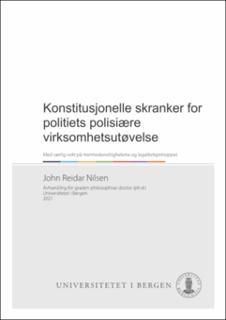| dc.description.abstract | The topic of this PhD thesis is:
Constitutional limitations for exercise of police authority - with particular emphasis on human rights and the principle of legality
Police are society’s civil power. It is important that the body which is set to exert force is given a clear framework for the exercise of the power. Where does the individual police officer seek information when deciding whether it is necessary and appropriate to intervene, and if necessary, by the use of force?
The Police Act, chapter II, is the main legislation that regulates police duties in general. According to Section 29, the Ministry is entitled to regulate and give special instructions to regulate the exercise of police authority. However, according to the Ministry decision of 16 November 2000, this authority has been further delegated to the National Police Directorate. The chief of police may also issue supplementary rules when local conditions render this necessary. The Ministry and the police exercise of the authority to issue further rules on the exercise of police authority has resulted in a large number of instructions and directives aimed at regulating the exercise of police authority.
Are these norms in accordance with the Norwegian government’s obligation to establish legal legislation which respects and ensures fundamental human rights, cf. the Constitution of the Kingdom of Norway Chapter E “Human Rights”?
The project and its topics will focus on three different perspectives:
Firstly, the individual’s right to be able to predict their legal position according to the principles of legality - “lex scripta” and “lex certa”.
Secondly, police breach of duty, or violation of the right to exercise power, is sanctioned by law. The police officer, who is empowered to, and in certain situations obligated to use force, is therefore in need of legal rules of a quality standard that sets clear limits for service obligation and the right to use force.
Thirdly, it is in everyone’s - the citizens, the state, the police force and the individual police officer’s - interest that the police are subject to effective and good control mechanisms. The citizens are dependent on it to ensure their rights. The Government relies on good control to carry out its obligations according to human rights. The police force credibility and legitimacy are founded on control mechanisms of good quality. The individual police officer depends on control mechanisms that can clarify the framework for good, proper and lawful performance of duty. Quality of the control mechanisms will always reflect the quality of the legal norms that regulate the police force performance of duty and use of force.
The purpose of the project can be divided into two different main themes. Firstly, I want to analyse and discuss the above-mentioned regulation on a legal dogmatic level to examine whether legislation is consistent with obligations under the national Constitution as well as international law.
Secondly, and in connection with the first theme, analyse whether police practice reflects a correct interpretation of existing law. In other words, to clarify the extent to which the actual exercise of power, regulated by the administration of justice through instructions, circulars and local directives made by the police, exercisable within specified legal norms.
The thesis has three main parts. The first part (chapters 1-4) gives a brief presentation of the legal area and the thesis’ research theme, research questions, limitations structure and legal sources and methods.
The second part (chapters 5-6) is mainly a de lege lata presentation where attention is directed to the principle of legality in a police context, together with selected human rights provisions in the Constitution. Both the Constitution as law, and the principle of legality as a rule/principle of law are to be regarded as constitutive, as they, by determining the framework for the authorites’ access to intervening exercise of authority vis-à-vis the citizens, help to define the limitations and scope for state power. In this way, they constitute central barriers for intervention by police with regard to exercise of authority.
The third part (chapters 7-15) contains a presentation and analysis of central legislation which form the basis for regulating police exercise of authority. The starting point for the presentation is “police activity as an administrative discipline”. The purpose of this part of the presentation is to explain the developmental features of the legal standard, compared with legal regulation of other State administrative activities. Furthermore, a presentation is given of the material content of the previously non-statutory general power of attorney and its significance as an expression of a legal culture before examining the purpose and considerations behind the codification. One of the central themes for this part of the presentation is to investigate whether the need to bring the police legislation in harmony with the legal requirements of the principle of legality was the real and main driving force behind the legislative work. Furthermore, I make an analysis of the police legislationʼs “democratic legitimacy” by asking critical questions concerning the legislative processes related to the codification of police intervention powers, cf. the Police Act of 1995, as well as police practice of assigned legislative competence.
To the extent that one should dare to put an “academic label” on the topic of the thesis, it can be described as an overall legality check with the police norm structure. And by the fact that the norm structure aims to regulate the actual exercise of authority, the presentation will also represent a legality check with the intervening exercise of police authority. | en_US |
